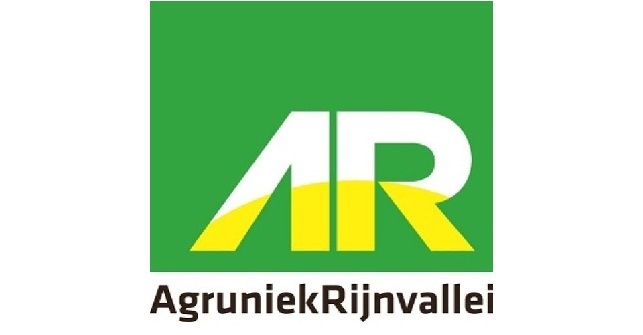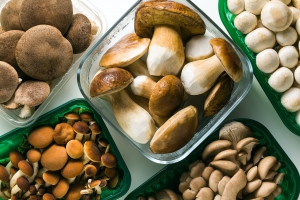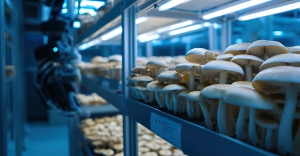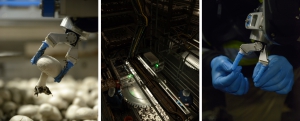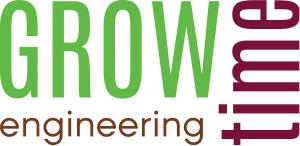What’s moving the mushroom industry right now?
What’s moving the mushroom industry right now?
The mushroom sector continues to evolve at pace. Automation, labour availability and cost efficiency remain dominant themes, while growers balance innovation with reliability on the farm floor.
Below are a few developments worth watching.
1. Automation: progress, but not autonomy
Robotics in mushroom harvesting keep improving, yet fully autonomous solutions are still limited in peak and variable flush conditions. As a result, more growers are exploring hybrid harvesting models, where technology supports – rather than replaces – skilled labour. The focus is shifting from “full automation” to consistency, ergonomics and uptime.
2. Labour strategy is becoming a technical issue
Labour shortages are no longer just an HR concern. Growers are increasingly looking at technical solutions to:
- reduce physical strain
- stabilise output quality
- make harvesting work more predictable
This is influencing investment decisions in equipment, layout and workflow design.
3. Data-driven growing gains traction
Yield tracking, flush performance analysis and real-time monitoring are becoming standard tools for larger operations. What stands out: growers are less interested in dashboards, and more in actionable insights that support daily decision-making on the farm.
4. Sustainability: from ambition to optimisation
Rather than big sustainability claims, the conversation is moving toward practical optimisation:
- energy efficiency per kg
- smarter use of substrates
- longer equipment lifecycles
Incremental improvements are proving more impactful than radical overhauls.
What to watch next
In the coming months, expect more discussion around:
- hybrid harvesting as a structural solution
- the ROI of semi-automation
- technology that adapts to biological variability, instead of forcing uniformity
We’ll continue to follow these developments closely and share insights that matter to growers, farm managers and technology partners.
The mushroom industry has always been an example of how biology and ingenuity can coexist. What started centuries ago as a craft based on observation, experience, and intuition is now rapidly evolving into a field where data and digital technology drive every decision. The next generation of mushroom farms is taking shape, intelligent, connected, and remarkably sustainable.
Automation becomes accessible
Until recently, automation was something only large farms could afford. Complex climate control systems, robotic picking solutions, and data-driven monitoring platforms were impressive but often out of reach for smaller growers. That landscape is now changing. As technology becomes more affordable and modular, small and mid-sized farms can adopt automation step by step, from simple environmental sensors to cloud-based farm management systems.
These tools help growers maintain stable growing conditions, reduce labor costs, and minimize waste. More importantly, they allow farmers to focus on the art of cultivation, rather than on manual data collection or repetitive control adjustments.
Smarter growing through data
Every mushroom tells a story of temperature, humidity, substrate composition, and microbial balance. By collecting and interpreting this data, growers can now understand their crops better than ever before. Artificial intelligence (AI) is entering the scene, helping to predict yields, identify anomalies early, and even recommend optimal growing cycles.
Imagine a system that learns the behavior of your farm, adjusting CO₂ levels, light exposure, or irrigation based on previous flushes while alerting you to subtle changes that might affect productivity. That’s not science fiction anymore; it’s the emerging reality of smart mushroom cultivation.
The rise of AI-assisted strain development
While climate control and automation enhance the growing environment, artificial intelligence could soon reshape what we grow. AI-assisted strain selection combines genomic data, performance tracking, and environmental inputs to identify which varieties thrive under specific conditions. This opens the door to developing new strains faster, with higher yields, better shelf life, or specific nutritional or medicinal properties.
For mushroom breeders and spawn producers, this digital layer adds precision to what has long been an art form, bridging traditional mycology with computational biology.
Transparency and traceability through blockchain
Consumers today want to know where their food comes from and mushrooms are no exception. Blockchain technology can bring new levels of transparency to the supply chain. From substrate sourcing to post-harvest logistics, each step could be securely logged, offering proof of sustainability, origin, and quality.
For growers, it’s also a way to build trust with buyers and regulatory bodies, simplifying certification and export documentation. In a world where sustainability is not just a value but a requirement, such traceability systems will likely become standard practice.
Sustainability: the core of innovation
At the heart of all this progress is a shared commitment to sustainability. Automation and digitalization are not replacing the grower, they’re empowering them to produce more efficiently, use fewer resources, and reduce waste. From optimizing substrate recipes to recycling heat and water within facilities, smart systems are helping farms close the loop.
The mushroom sector has always been a pioneer in circular agriculture. Now, by integrating technology, it is showing that environmental responsibility and innovation can grow side by side.
A future rooted in tradition and technology
The message is clear: the future of mushroom farming is intelligent, data-driven, and sustainable. Yet the essence of the craft remains unchanged, understanding living organisms and creating the conditions for them to thrive. By combining centuries-old cultivation wisdom with 21st-century technology, the mushroom industry continues to prove that innovation grows best on a fertile foundation.
Published by Mushroom Matter: connecting the global mushroom community through insight, innovation, and inspiration
The mushroom industry is entering a digital era. What was once guided solely by intuition, experience, and manual labor is now increasingly supported by sensors, automation, and data analytics. From substrate preparation to harvest, smart farming tools are reshaping how fungi are grown, making production more precise, efficient, and sustainable than ever before.
Precision growing in every layer
Inside modern growing rooms, environmental control systems are evolving into intelligent ecosystems. Sensors monitor temperature, humidity, CO₂ levels, and air circulation in real time. Artificial intelligence (AI) algorithms then adjust these factors automatically, ensuring ideal conditions for each growth phase.
This precision doesn’t just boost yields, it reduces energy consumption and minimizes human error. Instead of reacting to issues after they occur, farmers can anticipate and prevent them, achieving higher consistency and quality across crops.
Data as the new substrate
For decades, mushroom cultivation relied heavily on experience, the grower’s eye and intuition. Those remain invaluable, but now they’re being amplified by data. Smart platforms can collect thousands of data points per day, translating them into actionable insights: when to ventilate, irrigate, or adjust temperature.
Some farms use cloud-based dashboards that visualize performance across different growing rooms or even multiple sites. Others are experimenting with machine learning to recognize growth patterns and predict harvest times with remarkable accuracy.
In short, the farm is learning, and so are the fungi.
Automation lightens the load
Labor shortages have long been a concern in the mushroom sector. Smart technologies are helping to bridge that gap. Automated systems can handle repetitive or heavy tasks such as substrate loading, climate adjustments, or even mushroom picking with robotic precision.
While full automation isn’t feasible for every operation, even partial adoption, for example, using camera-guided monitoring or automated watering, significantly reduces workload while improving consistency. The result: growers can focus more on strategy, quality, and innovation instead of routine maintenance.
A sustainable shift
Beyond efficiency, smart farming supports a more sustainable production model. By fine-tuning environmental parameters, farms use less energy and water. Precise climate control minimizes waste, and optimized substrate management helps reduce contamination rates.
For forward-thinking producers, data also helps demonstrate sustainability performance to customers and investors, turning eco-efficiency into a measurable, marketable advantage.
The human touch remains
Even in the smartest farms, technology doesn’t replace people, it empowers them. Successful growers combine digital insights with hands-on experience and instinct. The art of mushroom cultivation remains rooted in understanding living organisms; technology simply provides new tools to nurture them better.
The road ahead
Smart farming in mushrooms is still in its early stages, but the direction is clear. With each innovation, whether AI-driven control, autonomous harvesters, or cloud-based analytics. the boundary between biology and technology grows thinner.
As these systems become more accessible and affordable, farms of all sizes can benefit from the data revolution. The result? Smarter farms, smarter fungi, and a more resilient, sustainable future for the entire mushroom industry.
Published by Mushroom Matter: connecting the global mushroom community through insight, innovation, and inspiration
Mycionics, a Canadian-based pioneer in advanced mushroom harvesting systems, is announcing the launch of its robotic mushroom harvesting and scanning system with South Mill Champs, one of North America’s largest mushroom farms.
A rigorous six-month pilot proved the market’s first economically viable solution to the industry’s pressing labour challenges. Employing a hybrid harvesting approach enabled by the Christiaens Group’s drawer infrastructure, this technology allows humans and robots to work side-by-side on centralized platforms. The method leverages humans for their skill, and robots for their precision and stamina. With two robotic arms, the system harvested 33% of the crop with quality exceeding human harvesting, while also providing real-time crop insights that optimize growing and harvest decisions.
“Having lived through the complexities of robotizing traditional mushroom farms, I am confident in this new hybrid approach,” said Stefan Glibetic, CEO of Mycionics. “Now validated by South Mill Champs’ commitment to this large-scale deployment, it marks a new era for mushroom production.”
Deployment at South Mill Champs will occur in two phases. Phase one, beginning July 2025, will implement Mycionics’ scanning and pointing technologies farm-wide. These are projected to enhance harvesting efficiency by 15% and increase crop yield by 4-8% through guided labour and precision picks. This phase also includes demonstrating Mycionics’ next-gen robotic system, capable of harvesting 75% of the crop through robotic picking, packing, sorting, and grading. Phase two will fully populate the farm with robotics in 2026.
Mycionics is poised to transform the industry beyond North America. Following South Mill Champs’ lead, several farms in Europe have committed to adopting the technology, signalling strong international interest and the broad applicability of Mycionics’ solutions.
For additional information, visit mycionics.com or contact This email address is being protected from spambots. You need JavaScript enabled to view it.
We welcome GROWTIME on board of Mushroom Matter
We welcome GROWTIME on board of Mushroom Matter! We are very pleased with this international player in the mushroom industry on our platform.
GROWTIME is a Polish based company who specializes in commercial mushroom farm equipment, especially mushroom picking lorries.
They have years of experience in the area of building machines to support production processes.
Most of their expertise has been gained while working on technical solutions to support industrial scale mushroom farming and harvesting.
Their flagship products help automate harvesting processes, while their full product range includes standard, off-the-shelf designs as well as machines tailored to individual requirements and dimensions.
Their quest for the optimal solution never stops, while balancing efficiency with durability of each of their products.
To learn more about GROWTIME, please visit their website here!




